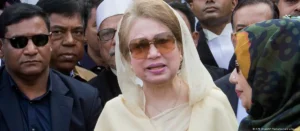
In the wake of a major cost-of-living crisis, the main opposition Bangladesh Nationalist Party (BNP) and its allies have called for Prime Minister Sheikh Hasina to step down before the next election, due to be held by January 2024. They want it to be held under a neutral caretaker government.
So far, the prime minister and her ruling Awami League have rejected the demand.
Where is Khaleda Zia?
The BNP has been able to organize major rallies despite itself being tossed into chaos in 2018 when its leader, Khaleda Zia, was charged with graft and sentenced to five years in jail. A higher court extended the term to 10 years.
Zia, who is at her home in Dhaka, has not been seen at any political events since then. In recent months, she has been admitted to hospital several times due to deteriorating health.
Now 77, Zia became Bangladesh’s first female prime minister in 1991. She was elected for another term in 1996, but her government lasted only a few months. She resigned after introducing a caretaker system on the demand of opposition parties led by the Awami League. In 2001, she was once again elected prime minister and served another five years.
Zia and the current prime minister are considered to be archrivals. When she was jailed in 2018, Zia’s supporters said the corruption charges against her were a politically motivated attempt to keep her out of office.
“Her trial was very controversial,” explained Asif Nazrul, a law professor at the University of Dhaka. “Even at the appeal stage, her punishment was doubled by the high court, which is very rare in Bangladesh or many other common law states,” he told DW.
“She is the most popular leader in Bangladesh in terms of the constituency she won personally in the past parliamentary elections. This incumbent government could not have confronted her popularity except by detaining her,” Nazrul added.
Power vacuum in BNP
Zia’s current absence from the political scene can be explained by two factors — legal troubles and bad health, said Michael Kugelman, the director of the South Asia Institute at the Washington-based Woodrow Wilson International Center for Scholars.
“It’s hard to know if BNP leaders are exaggerating when they say her health is so bad that she’s near death. But it’s clear that her legal and health travails have prevented her from being the public figure that she had been for so long,” he told DW.

After Zia was jailed, her son Tarique Rahman, who has lived in exile in UK since 2008, became the BNP’s acting chief. He too has had legal troubles of his own — with several charges and in absentia trials over graft, money laundering, criminal conspiracy and multiple counts of murder. The BNP claims that the cases against him are also politically motivated and that nearly 4 million of its activists faced legal cases between 2009 and 2022.
Kugelman says that in light of the situation with Zia, the BNP is trying to boost Rahman’s image. “The recent BNP rally when a speech of Rahman’s was broadcast to the crowd — the first time he’s been heard that way in Bangladesh since he fled 15 years ago — suggests that the party is trying to bring him closer to the support base and perhaps prepare it for a transition of power,” he told DW.
“But it’s difficult, even in a dynastic party, to transfer leadership duties to someone based abroad and far away. Not to mention, when you have someone who has been abroad for 15 years, there will be concerns that they are out of touch with ground realities, and that’s not the perception you want people to have about the next party leader,” Kugelman stressed.

New face of the opposition
In the physical absence of the BNP’s two top leaders, it is the party’s secretary general, Mirza Fakhrul Islam Alamgir, who is its face on the ground. He has become increasingly visible and vocal in recent years, and is currently fronting the ongoing protests.
“At least publicly, Alamgir is taking on a major leadership role,” said Kugelman. “But in private, behind the scenes, where the big decisions are made, leadership likely remains a family affair, with Zia and Rahman.”
Nazrul from the University of Dhaka thinks that the party still needs its top leaders. “Alamgir is an accomplished leader now and has an excellent rapport with Tarique Rahman. But Rahman’s physical presence in Bangladesh could have strengthened them even more,” he told DW. “But it could be very risky as well, as it is almost certain that he will be arrested the moment he comes back.”
The BNP has threatened to boycott the election if it is held under Hasina, saying that a credible vote is impossible under her government. It is one of many parties that want the caretaker administration, which was scrapped by the Hasina government in 2011, to be reinstated.
Edited by: Darko Janjevic


